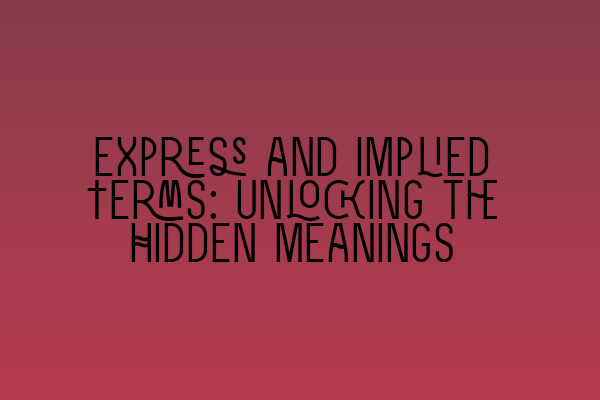Express and Implied Terms: Unlocking the Hidden Meanings
When entering into a contract, it is essential that both parties understand and agree upon the terms that govern their agreement. These terms can be expressly stated or implied from the conduct of the parties or the nature of the transaction. Understanding the difference between express and implied terms is crucial for unlocking the hidden meanings within a contract.
Express terms are those that are explicitly stated and agreed upon by the parties. These terms can be found in various forms, such as written or oral agreements, emails, letters, or even through conduct. Express terms provide clarity and certainty to the parties involved, as they explicitly outline their rights and obligations.
For example, if you are purchasing a new car from a dealer, the price, model, and delivery date would likely be express terms of the contract. These terms are explicitly stated and agreed upon by both parties, leaving no room for interpretation or confusion.
Implied terms, on the other hand, are not expressly stated by the parties but are nevertheless understood to be part of the agreement based on the circumstances surrounding the contract. These terms are not explicitly written or communicated, but are instead inferred from the behavior, custom, or the nature of the transaction.
Implied terms are often used to fill gaps in the contract where the parties have not expressly addressed certain matters. These terms can arise from various sources, such as legislation, trade custom, or previous dealings between the parties. Implied terms play a significant role in contracts, as they ensure fairness and reasonableness in the agreement.
For instance, when you enter a restaurant and order a meal, it is implied that the food will be fit for human consumption. This implied term is not explicitly stated in the contract, but it is understood by both parties and expected in any dining experience.
Implied terms can also arise from legislation. In many jurisdictions, there are statutory provisions that imply terms into certain contracts to protect consumers or ensure fairness in commercial dealings. For example, consumer protection laws may imply terms that provide guarantees on goods purchased.
It is important to note that not all implied terms have the same legal force. Some implied terms are considered to be ‘terms implied in law’ or ‘terms implied by statute,’ while others are ‘terms implied in fact.’ Terms implied in law are those that are automatically incorporated into certain types of contracts, regardless of the intentions of the parties. These terms are seen as fundamental and cannot be excluded or modified by the parties.
On the other hand, terms implied in fact are those that are inferred from the circumstances of the particular contract and the intentions of the parties. These terms arise when it can be implied from the parties’ conduct or the nature of the transaction that certain terms should be included. Unlike terms implied in law, terms implied in fact can be excluded or modified by the parties if they explicitly express their intentions.
When dealing with express and implied terms, it is crucial to carefully review the contract and assess any potential gaps or ambiguities. By understanding the difference between these two types of terms, you can unlock the hidden meanings within the contract and ensure that both parties’ rights and obligations are properly addressed.
In conclusion, express and implied terms are both essential in contract law. Express terms provide clarity and certainty, while implied terms ensure fairness and reasonableness. By understanding the difference between these two types of terms, you can navigate the complexities of contract law and unlock the hidden meanings within your agreements.
To further enhance your understanding of contract law and prepare for the SQE exams, check out these related articles:
– SQE 1 Practice Exam Questions
– SQE 1 Practice Mocks FLK1 FLK2
– SQE 2 Preparation Courses
– SQE 1 Preparation Courses
– SRA SQE Exam Dates
These resources will provide you with valuable insights and help you excel in your contract law studies. Good luck!
